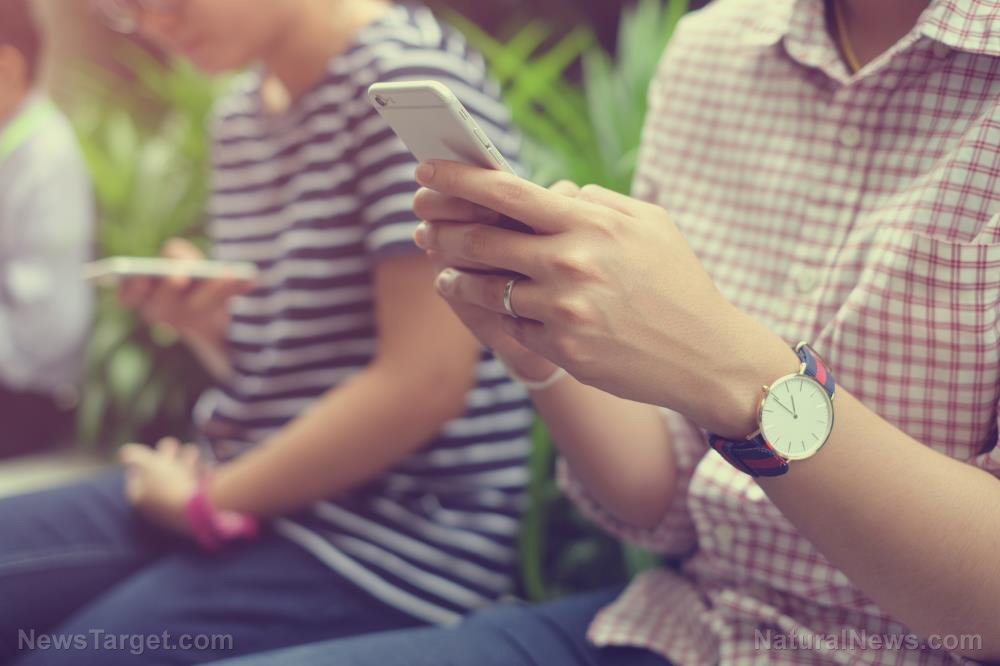Mental health in the digital age: 7 Ways to control your smartphone use
05/12/2023 / By Zoey Sky

Many Americans spend too much time on their smartphones. You’re probably reading this article on a smartphone, and you are likely pausing frequently to check other apps if you’re feeling bored.
If you’re worried that you’re spending a lot of time staring at your phone, it may be time to learn how to manage your smartphone use before it harms your mental health. (Related: Brain food: Nutrient therapy can help address mental health issues.)
Jeff Cain, an associate professor of pharmacy practice and science at the University of Kentucky (UKY), has been studying salience as an aspect of compulsive phone usage. He said that he began tracking society’s confrontation with “digital afflictions” since Facebook first gained popularity on college campuses.
In neuroscience, salience refers to “the property by which something stands out.” In economics, meanwhile, salience refers to your predisposition to prioritize goods and information that you consider noteworthy or more relevant over other goods and information.
Cain is also the co-author of a study published in the American Journal of Pharmaceutical Education in 2022 where he and his fellow researchers tried to find out the effectiveness of applying the salience principle of economics to reduce how much time UKY pharmacy students spent on their smartphones.
For the study, researchers observed how much UKY students would use their smartphones after reducing salience by:
- Changing the display to grayscale
- Disabling all social media notifications
- Removing social media application icons from their home screens
- Moving their phones away from the beds before sleeping
Data showed that 52 percent of the participants reported a decrease in overall smartphone use. Grayscale displays made smartphones more boring and reduced attraction by 34 percent.
At least 31 percent of the students reported that they used social media less. Twenty percent of the volunteers reported that they found it easier to fall asleep or had better quality sleep. At least 15 percent of the students reported that they experienced less stress, anxiety or depression.
However, 12 percent of the students shared that they experienced heightened concerns about missing communications, a feeling often described as FOMO or fear of missing out.
After the challenge, Cain kept his phone on grayscale mode permanently. He explained that grayscale makes a phone look boring, so you are more likely to use it less.
Tips to control use of smartphones
Unlike vices such as smoking and drinking alcohol, smartphones are often necessary for modern life.
But thanks to a growing body of research, experts have discovered several ways to manage your smartphone use.
Keep your phone somewhere else when it’s time for bed
Many smartphone users think browsing apps in bed is a harmless habit, but this can reduce both sleep quality and duration.
Hiding your phone in a different room can prevent this habit and it can also prevent you from using your phone immediately upon waking.
If you have trouble falling asleep, try reading before bed.
Turn off all notifications
Notifications can distract you, but if you are having trouble focusing because of your phone, turn them off or minimize them.
Disable notifications by using “Do Not Disturb” mode, but keep in mind that this feature also turns off call and text notifications. Alternatively, you can switch notifications for specific apps in your phone’s settings.
Another option is to specify what kind of notifications you receive in the settings for individuals.
Turn your phone over or hide it
If the urge to check a text or browse your phone while working is too great to ignore, just turn your phone over so you don’t see the screen.
You can also switch to silent mode to make this tip more effective.
Use grayscale mode
Colors grab your attention and this is evident in red notification bubbles or bright colors on various social media apps.
To reduce your smartphone use, turn on grayscale to make things more boring. Some phones will also let you automatically specify when to turn the grayscale mode on and off.
Get a good night’s sleep by changing your phone’s settings so it switches to grayscale mode at least one hour before bedtime.
Delete social media apps from the home screen
Social media apps are often linked to excessive smartphone use, and making it harder to access them immediately can help keep social media off your mind.
Use your phone timer
If you’re fully engaged in another task, you won’t have time to check your smartphone.
If your screen time is affecting your work or other activities, set a timer on your phone with your preferred focus duration and set it aside. Your phone will be occupied while the timer app is running, and you’ll be more incentivized to keep working.
Practice mindfulness
If your smartphone is affecting your focus or mental health, the next time you scroll on your phone out of boredom, pause. Listen to what your body is telling you and try to understand why you are using your phone excessively.
When you take the time to become more aware of the present moment and of your mind itself, there is a corresponding awareness of how easily you can become distracted, as well as the source of that distraction.
You can be more mindful through prayer, meditation, or secular practice. This can help you naturally avoid harmful and excessive technology use.
Watch the video below to know more about blue light-blocking glasses that can help protect your eyes from blue light emitted by smartphone screens.
This video is from the Health Ranger Store channel on Brighteon.com.
More related stories:
Healthy habits and mental well-being: Natural ways to beat depression.
Are you feeling down? A digital detox can help improve your well-being, says experts.
Alabama school districts sue social media companies for causing youth mental health crisis.
Sources include:
Submit a correction >>
Tagged Under:
beatdepression, computing, gadgets, Glitch, healthy habits, information technology, mental health, Mind, self-help, smartphone addiction, smartphone use, Smartphones, Social media, tips
This article may contain statements that reflect the opinion of the author
RECENT NEWS & ARTICLES
COPYRIGHT © 2017 MIND BODY SCIENCE NEWS




















